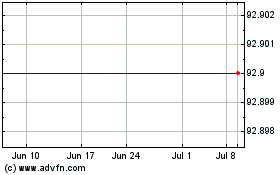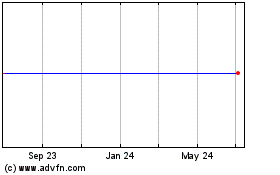By Kane Wu and Julie Steinberg
The pace of big Chinese takeovers abroad is slowing as buyers
contend with rules tightening the flow of money out of the country
and increased government scrutiny at home and overseas.
Bankers say many of the record-breaking $225 billion in overseas
acquisitions Chinese companies announced last year are stalled by
financial or regulatory hurdles -- including the country's
biggest-ever deal, China National Chemical Corp.'s $43 billion bid
for Syngenta AG , a Swiss seed and pesticide maker. European
regulators this month extended the deadline for their review of
ChemChina's bid a second time, to April.
More Chinese acquirers are backing out of deals. While Chinese
firms announced more than double the amount of overseas
acquisitions last year versus the previous, the value of deals
withdrawn in 2016 was up around sevenfold, to $38.39 billion,
according to Dealogic. The average number of days it took a Chinese
buyer to complete an overseas deal in 2016 edged upward throughout
the year, with November and December notching the highest levels,
at above 140 days, according to Dealogic.
A major factor behind the slowdown: stricter policing of
overseas acquisitions by Chinese regulators to curb a flood of
money leaving the country.
The resulting uncertainty about regulatory approvals has damped
some investors' enthusiasm for overseas deals. "It is unmistakable
that Chinese investors are far more cautious amid mounting
uncertainties," said Fred Hu, chairman of Primavera Capital. Mr.
Hu's Chinese private-equity firm is a prominent deal maker involved
in last year's biggest U-turn: Anbang Insurance Group Co. dropping
its $14 billion bid for Starwood Hotels & Resorts Worldwide
Inc.
Mergers and acquisitions the world over go through cycles, and
given the size, wealth and ambition of corporate China, financiers
say the country's surge in overseas, or outbound, deals is likely
not stopping, but taking a break.
Some well-connected Chinese acquirers are still striking smaller
deals. Ant Financial Services Group, an affiliate of online
shopping giant Alibaba Group Holding Ltd., clinched a deal Thursday
to buy U.S. money-transfer provider MoneyGram International Inc.
for $880 million . Valeant Pharmaceuticals International Inc. also
agreed to sell its Dendreon cancer business to Chinese conglomerate
Sanpower for $820 million earlier this month.
"In the long run, the trend of China Inc. going global should
not be affected" by the current foreign-exchange controls, said
Wang Hongzhang, chairman of state lender China Construction Bank
Corp., at a January event in Hong Kong. His bank offers financing
for many Chinese outbound deals, including Anbang's Starwood
bid.
For now, though, Chinese companies are increasingly anxious
about deals abroad -- particularly the biggest, which get the most
scrutiny.
Chinese regulators, including the Commerce Ministry and the
country's top economic-planning agency, must now clear many
outbound deals larger than $1 billion, as well as everything more
than $10 billion, before companies can get approval to move funds
offshore, according to people with knowledge of the matter and
documents reviewed by The Wall Street Journal. Regulators also are
retroactively examining many pending deals that had earlier been
approved, causing delays, according to people familiar with the
matter.
State-owned China Resources Beer (Holdings) Co. dropped out of
an auction for Eastern Europe brewing assets being sold by
Anheuser-Busch InBev SA NV in December, after China's
economic-planning agency declined to approve its bid, according to
people familiar with the situation. Representatives for China
Resources and AB InBev declined to comment.
Meanwhile, Chinese deals continue to face scrutiny from overseas
regulators. Australia this month said it will set up a new body to
assess security risks of foreign investments, following a surge in
Chinese bids to purchase everything from ports to electricity
assets. Anbang's $1.57 billion acquisition of U.S. life insurer
Fidelity & Guaranty Life has stalled for more than a year
because the Chinese insurer hasn't provided enough detail on its
ownership to satisfy state insurance regulators, people familiar
with the matter said. One of these people said Anbang is in talks
with New York regulators and plans to refile its application in the
first quarter.
Many sellers are asking for money to be placed in offshore
escrow accounts to ensure they get paid, a development that has
become common in the past year, bankers and lawyers say. HNA Group
deposited $500 million in a U.S. account as breakup fee for its
$6.5 billion proposed purchase of a 25% stake in Hilton Worldwide
Holdings Inc.
State-owned ChemChina already was grappling with a heavy debt
load before it struck the Syngenta deal. Worries about those debt
levels caused one Chinese state bank to pass on financing the bid,
according to people familiar with the situation. ChemChina's
Chairman Ren Jianxin tapped HSBC Holdings PLC and China Citic Bank
International Ltd. to lead the $33 billion loan-financing effort.
The lack of strong backing from big state lenders raised questions
among investors over whether the deal had full support from
Beijing.
A ChemChina spokesman declined to comment and declined to make
Mr. Ren available for comment.
The deal was approved in August by the Committee on Foreign
Investment in the U.S., or CFIUS, which scrutinizes deals for
national-security risks and has blocked several high-profile
Chinese deals during the past few years. In Europe, antimonopoly
regulators are still combing through ChemChina's and Syngenta's
assets to determine what may need to be divested after extending
the deadline twice.
China's Commerce Ministry too has yet to give the nod, a person
familiar with the matter said. It isn't clear whether the Chinese
economic-planning agency is currently examining the deal.
"ChemChina and Syngenta remain fully committed to the
transaction and are confident of its closure," said a Syngenta
spokesman.
Mr. Ren has been undeterred by the delays, telling people around
him not to worry about the fate of the Syngenta deal, and that the
current obstacles won't influence other potential deals, people
familiar with the matter said.
--Lingling Wei, Leslie Scism and Natalia Drozdiak contributed to
this article.
Write to Kane Wu at Kane.Wu@wsj.com and Julie Steinberg at
julie.steinberg@wsj.com
(END) Dow Jones Newswires
January 27, 2017 19:39 ET (00:39 GMT)
Copyright (c) 2017 Dow Jones & Company, Inc.
Syngenta (NYSE:SYT)
Historical Stock Chart
From Oct 2024 to Nov 2024

Syngenta (NYSE:SYT)
Historical Stock Chart
From Nov 2023 to Nov 2024
